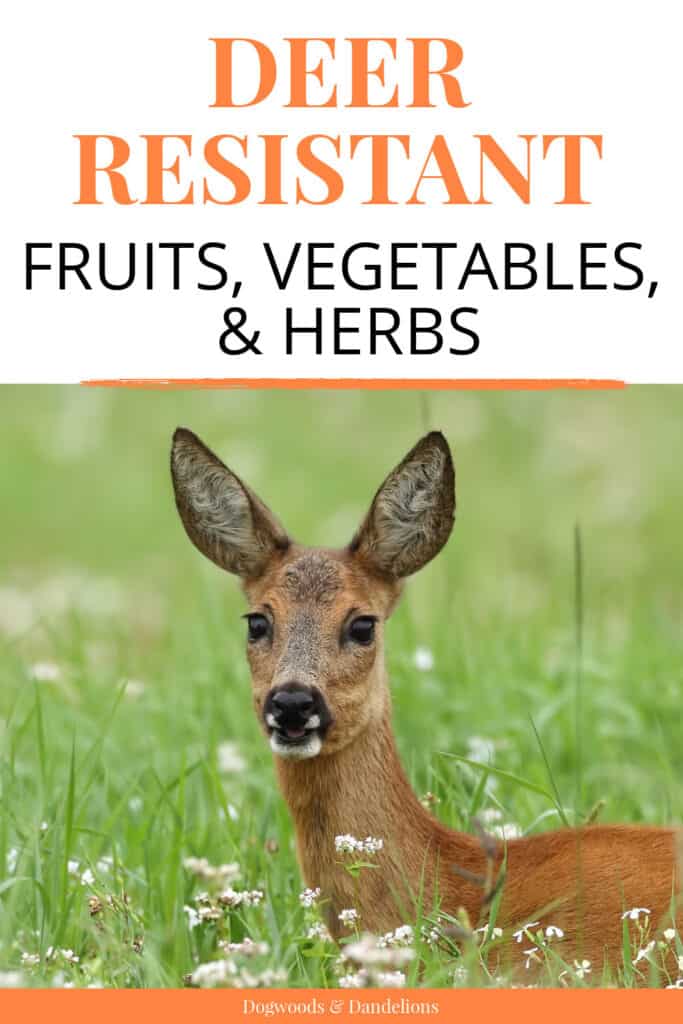How to Plant a Deer-Resistant Vegetable Garden
When growing a vegetable garden, most people are growing vegetables for themselves, not the wildlife. But when you live in a rural area (and sometimes even in a populated urban area) critters can be troublesome.
And deer can be some of the most difficult pests to deal with. But can you grow a deer resistant vegetable garden? The short answer is maybe.
Affiliate Disclosure: Please note that some of the links in this article may be affiliate links and I may receive a small commission if you purchase something through a link. It will not change your cost. As an Amazon Associate, I earn from qualifying purchases. For more information, see my disclosures page.)
Here in North Carolina, the white-tailed deer population has seemingly exploded. But I don’t really think there are a larger number of deer. I really think that with all the new housing developments, the deer have nowhere to go.
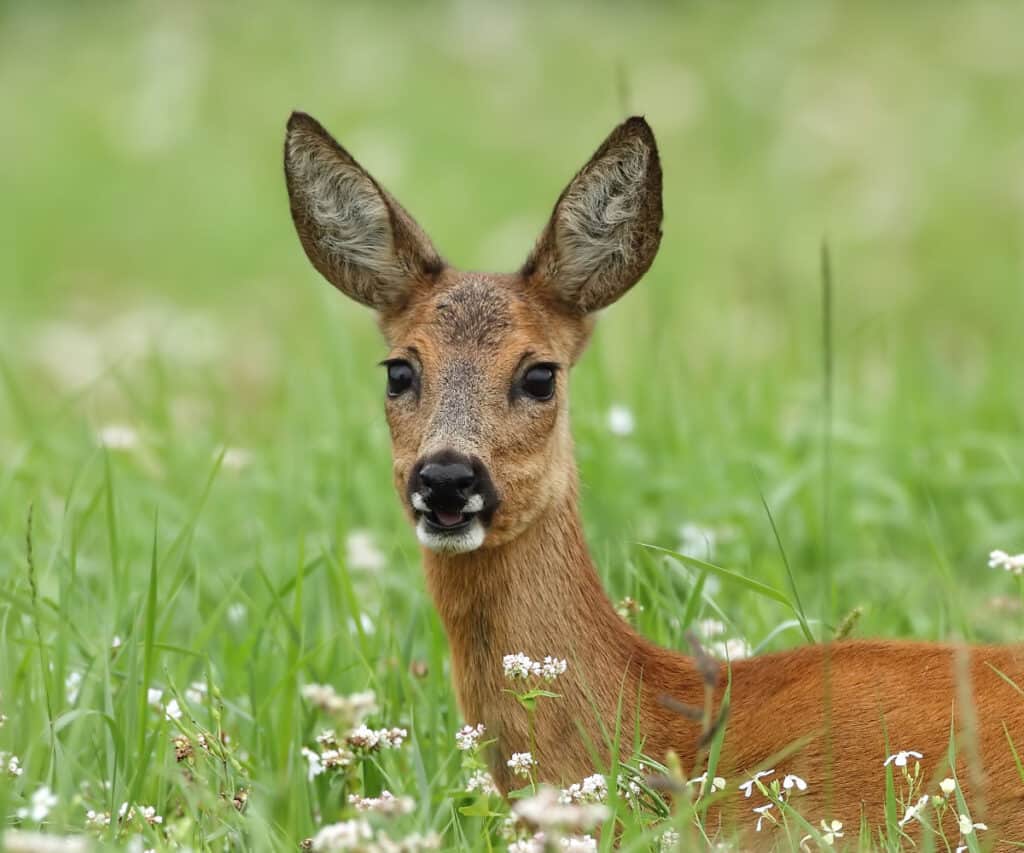
Builders are clearing land quickly, leaving the deer without wild food sources. So when deer discover tasty plants in your yard, they are likely to come back and keep coming back until they destroy most of your garden.
Let’s look at some deer-resistant vegetables, fruits, and herbs that you can plant so that hopefully you can enjoy the “fruits” of your labor.
If you are looking to keep deer and other critters out of your garden, my post on How to Keep Wildlife Out of Your Garden will give you some ways that may work.
Keep in mind, that very few plants are truly deer-proof. A hungry deer will eat almost any plant, especially if there is no other food nearby.
How to Identify Deer Damage
Before worrying about planting a deer resistant garden, you need to be sure it is actually deer that are doing the damage. Many times deer and rabbit damage can look much the same.
Both critters prefer the tender young shoots of new plants emerging from the ground in early spring. And both deer and rabbits will nibble at plants at ground level. Deer however will eat plants much higher up than rabbits.
So if you notice leaves that have been eaten on beans and vining crops that are grown on a trellis, as well as fruit trees or vines above 3 feet, you are likely dealing with deer, not rabbits.
Deer-Resistant Plants
Listed below are some of the more deer-resistant vegetables. Many root vegetables are fairly safe from deer since they don’t eat anything below the surface.
However, deer will eat the tops of vegetables like carrots and parsnips. Usually eating the tops won’t ruin the edible vegetable growing below the surface.
Most deer get a large portion of their water from plants, so they tend to enjoy juicy plants like hostas, lilies, tulips, grapes, and apples the most.
In contrast, deer typically don’t like plants with a strong odor, thick, hairy plants, prickly vegetables, and plants that have a bold taste.
Best Deer Resistant Vegetables
Keep in mind, these are vegetables deer are less likely to eat. There is no such thing as totally deer-proof plants.
- artichoke
- asparagus
- carrots
- eggplant
- garlic
- leeks
- onions
Deer Resistant Herbs
Many culinary herbs are deer resistant. Deer aren’t as fond of herbs because of their strong scent.
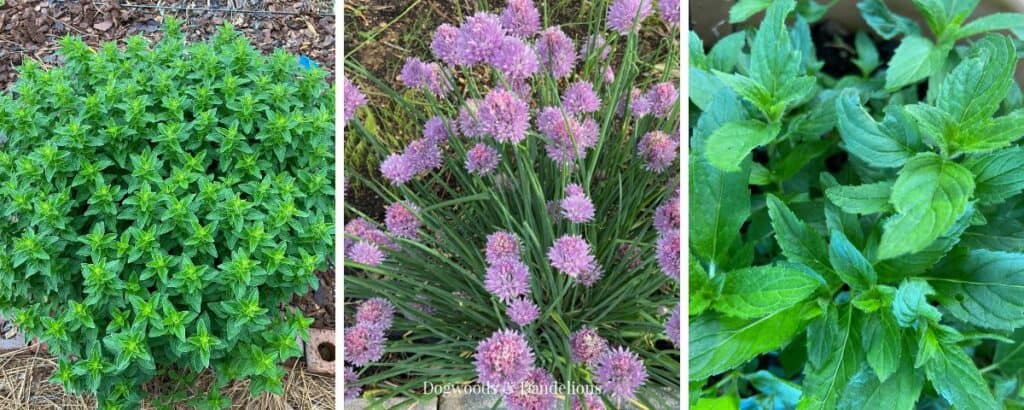
- chives
- dill
- fennel
- lavender
- lemon balm
- marjoram
- mint
- oregano
- parsley
- rosemary
- sage
- tarragon
- thyme
Fruits That Aren’t as Attractive to Deer
- fig
- rhubarb
Plants Deer MAY Eat
Deer may eat these plants if there are no other food options available. However, if some of the other fruits, vegetables, and herbs are around, they may leave these plants alone.
- basil
- bok choy
- borage
- Brussels sprouts
- cilantro
- cucumbers
- horseradish
- kale
- melons
- olives
- okra
- peppers
- potatoes
- radish
- squash
- tomatoes
- zucchini
Plants Deer Love
I’ve already mentioned some of these, but I wanted to give you a list of plants that deer love. These will likely be the first things to get eaten if you have deer visiting your garden regularly.
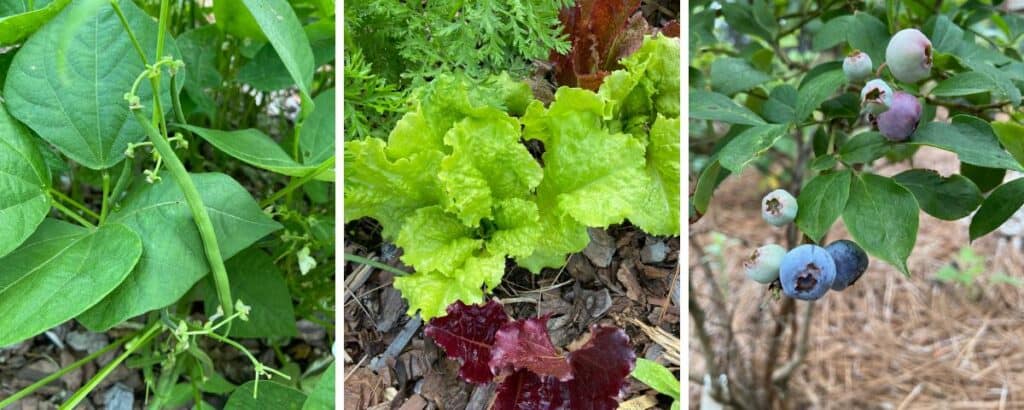
- apples
- beans
- beets
- blueberry
- broccoli
- cabbage
- cauliflower
- collards
- grapes
- lettuce
- peas
- pears
- plums
- pumpkins
- raspberries
- spinach
- strawberries
- corn
- sweet potatoes
- Swiss chard
But of course, most of us want to plant some of these vegetables and fruits in our backyard gardens. So what can you do to prevent the deer from destroying your garden? Keep reading for some tricks that may help.
Do Deer Like to Eat Tomato Plants?
I also want to remind you that just because plants are deer resistant doesn’t mean that deer won’t eat them.
Apparently, our deer here in North Carolina love tomato plants. Several years ago, I planted 42 tomato plants in my garden in the spring. In mid-June, we went on vacation.
When I came home a week later, the deer had eaten the leaves off almost every single tomato plant. The tomato plants that had the least amount of damage were the cherry tomato plants.
Deer also seem to enjoy my okra, even though it is a bit prickly. So keep in mind, not many plants are totally deer proof.
Thankfully most of the plants recovered, but the harvest was delayed quite a bit because the plants had been blooming when I left. After that, I decided to investigate ways to keep deer out of my garden.
Ways to Keep Deer Out of Your Garden
There are many ways to try to keep deer out of your vegetable garden. But the only way to ensure the deer stay out is to build a tall fence.
Build a Fence to Keep Deer Out
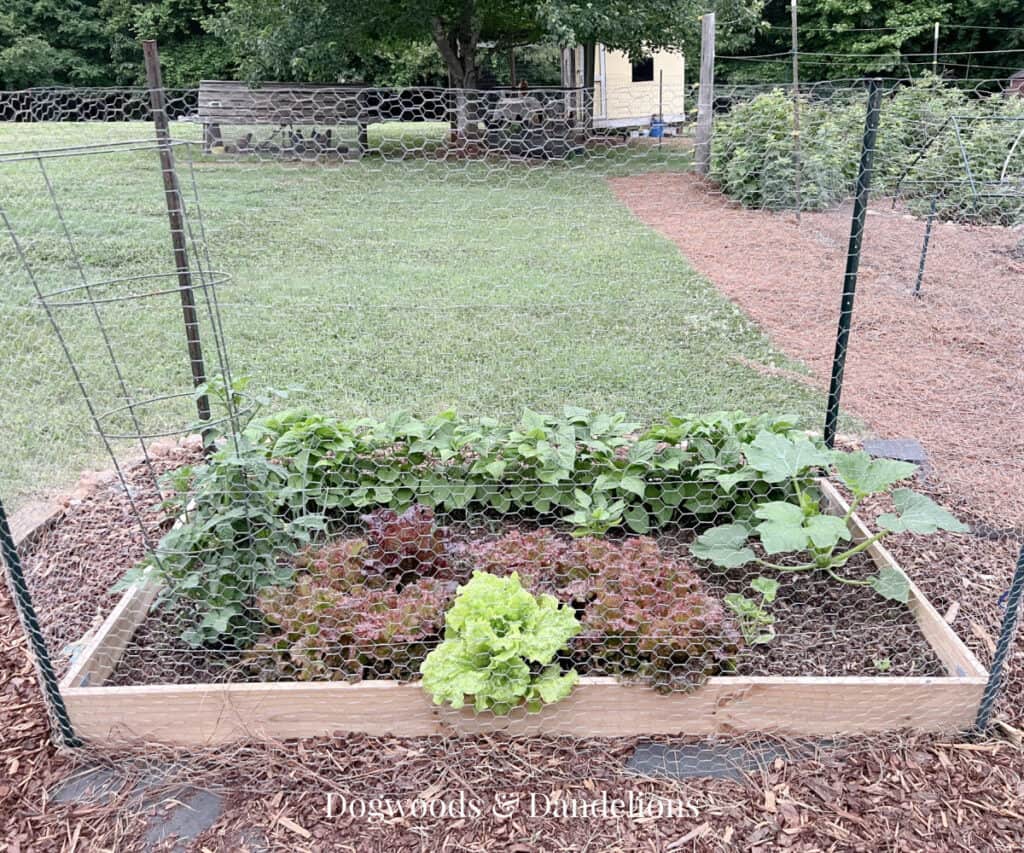
If you truly want to keep deer out of your garden, the best way is to build a tall fence. Usually, to keep deer out, a fence needs to be at least 7 to 8 feet tall.
However, deer don’t like jumping into small spaces. If you just have a small raised bed garden, some chicken wire and a few posts will work well to keep the deer out like in the picture above.
For a larger garden, there are many types of fencing that will work, but the easiest and least expensive is probably an electric fence.
Other Options for Keeping Deer Out of the Garden
If you can’t afford a fence, planting fragrant garden plants among your vegetables can help. The stronger the scent, the more likely the plant will repel deer.
Another trick that can help is to plant lots of herbs among your vegetables. This can help confuse the deer so that they have more difficulty locating their favorite plants in your garden.
Herbs like mint, rosemary, and sage are some of the best herbs to repel deer. (Just remember to plant mint in a container and place it in your garden. Mint can quickly take over an area if not contained.)
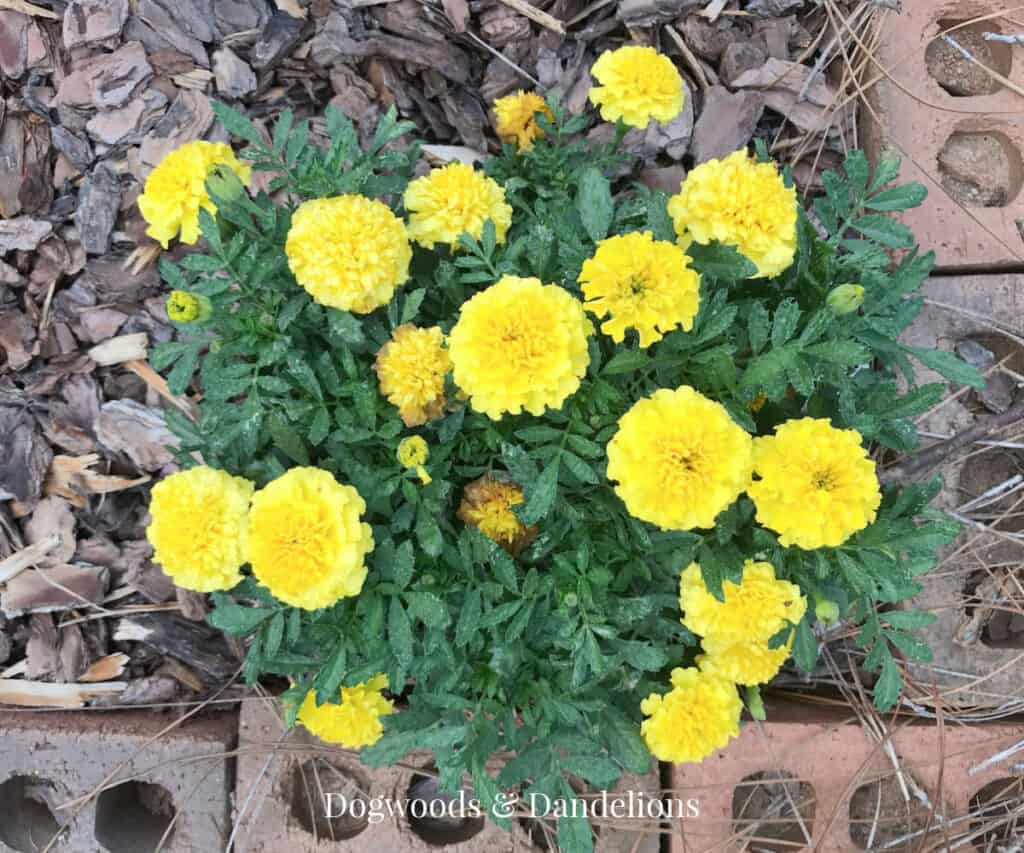
And a few flowers like strongly-scented marigolds and plants with hairy leaves or prickly leaves are also not as attractive to deer. (But as I’ve mentioned before, deer will eat almost anything if they are hungry.)
If you only have a small garden, you may be able to cover the garden with chicken wire, row covers, or deer netting. The downside to using these is that they have to be removed so that you can work in your garden, but they usually do work to keep the deer from devouring your vegetables.
Using Deer Repellent
There are various things on the market that are made to repel deer. Many work with varying degrees of success.
Sprinkling cayenne pepper on the plants has been somewhat successful in my garden. However, it has to be reapplied after every rain and it can burn some plants.
Some of my readers swear by placing bars of Irish Spring soap around their garden. I can’t vouch for this method but some people say it works.
There are also many deer-repellent products on the market today. I haven’t tried them, but they may be worth it if you create a physical barrier to keep out the deer.
Plant a Garden Just for the Deer
While on the front end, planting a garden just for the deer might seem like a good idea, there is no guarantee that the deer will eat the garden prepared for them and leave yours alone.
This also means you have the expense of planting 2 gardens. And you have to have the space to do it. Most of us just don’t have that kind of time, money, or land.
And finally, planting extras doesn’t always work. Remember my 42 tomato plants in the story above? The deer mowed down every single one. So planting extra vegetables just for the deer isn’t usually the solution either.
So, if you’ve seen deer in your area, planting deer resistant vegetables, fruits, and herbs can help you garden without the local deer population eating all your hard work. But if you still want to plant some of the edible plants deer love, I’ve shared some ways to keep deer out of your garden.
